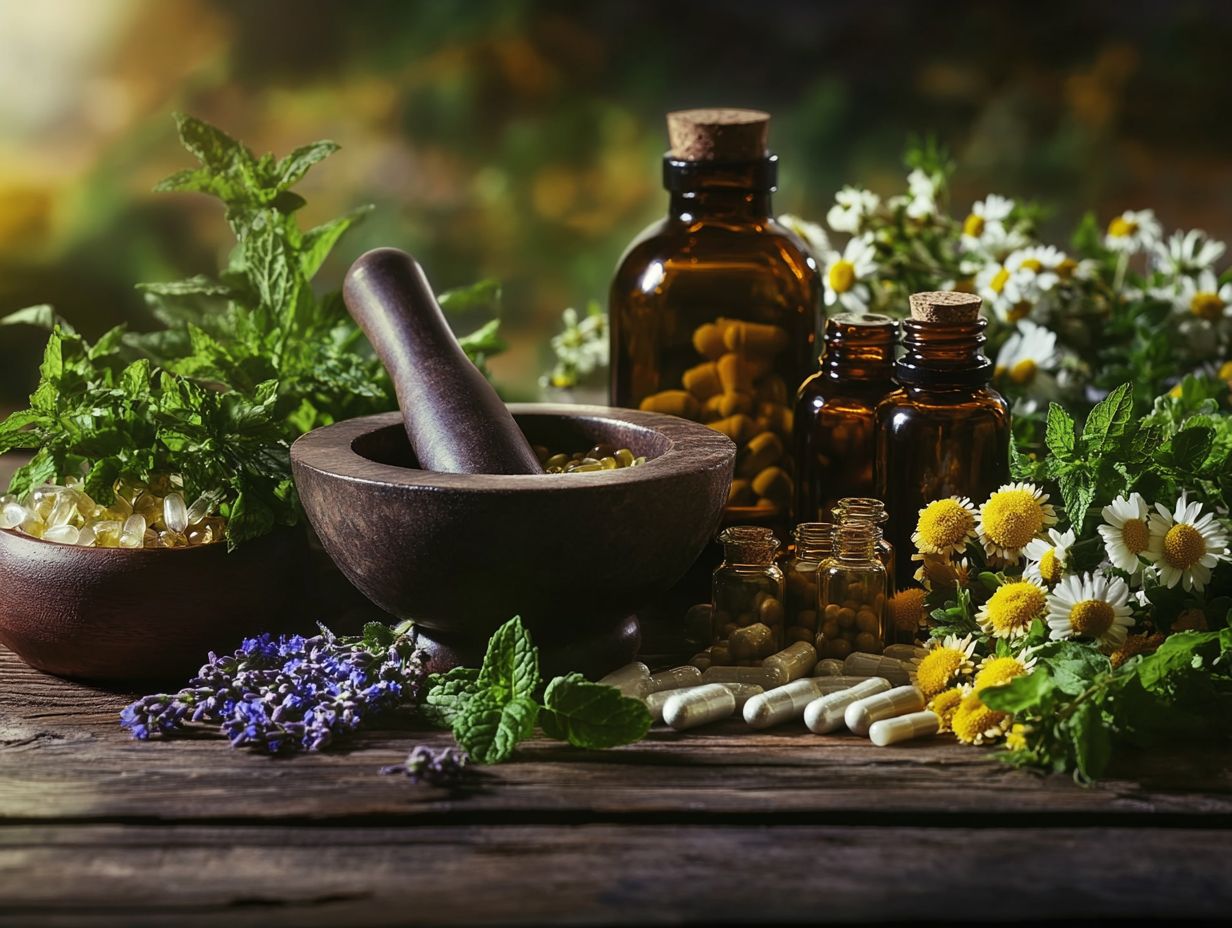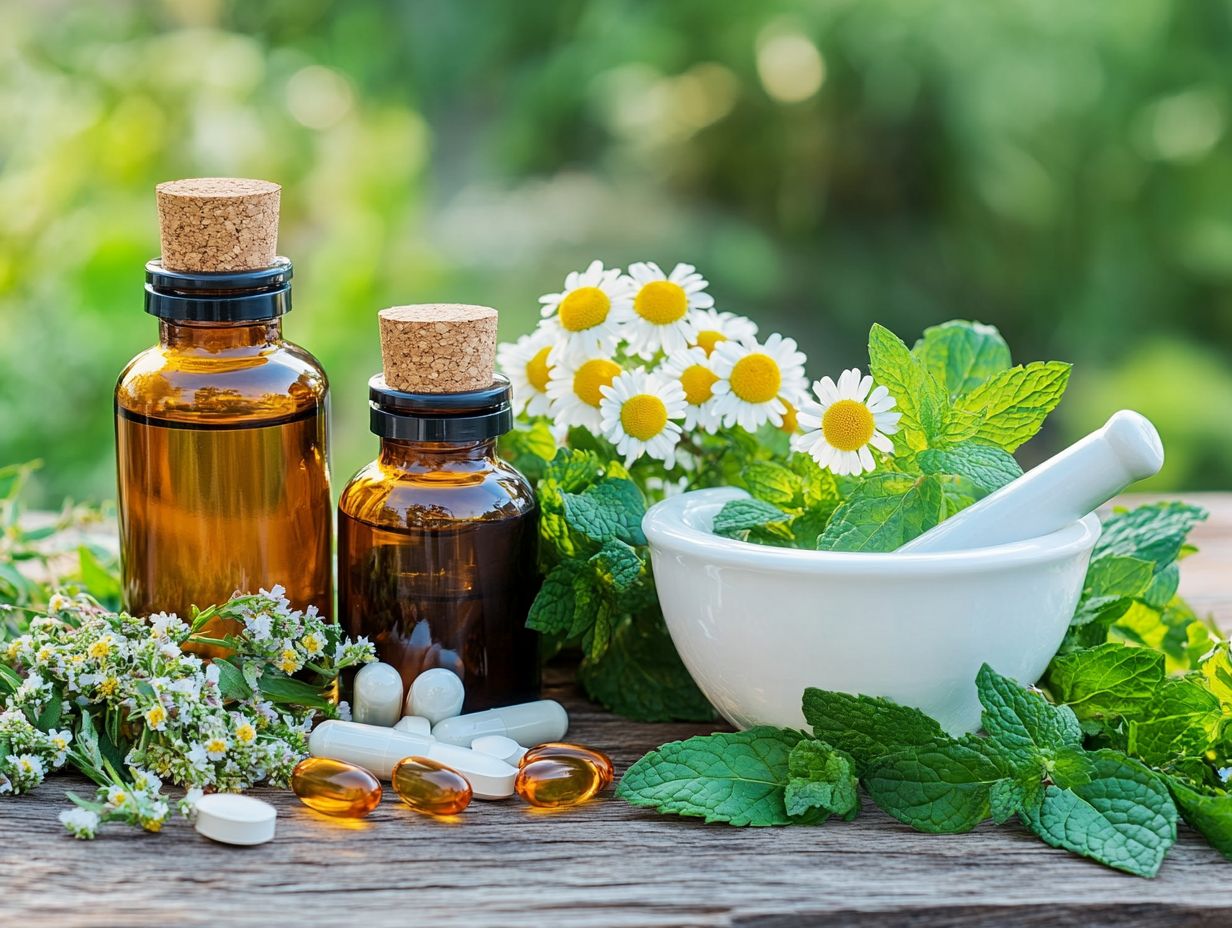What Should You Know About Herbal Supplements?
Herbal supplements have become increasingly popular as natural alternatives for enhancing your health and wellness. They offer a variety of types and applications that can provide potential benefits, but it’s important to remain aware of the associated risks.
Let s dive into the exciting world of herbal supplements and discover their benefits! This article covers the different kinds of herbal supplements, their common uses, and the advantages they might provide. You ll also uncover necessary safety concerns, potential side effects, and how to choose and utilize these supplements wisely.
An overview of current regulations helps you make informed decisions.
Dive in to explore this captivating topic!
Contents
Key Takeaways:

Herbal supplements are natural products made from plants, herbs, and other ingredients, often used for medicinal purposes. They can provide health benefits but also carry risks, including side effects and interactions with medications. Choose and use herbal supplements carefully, considering factors such as quality control, proper usage, and dosage. Current regulations aim to ensure the safety and efficacy of these products.
Discover the Power of Herbal Supplements
Herbal supplements are derived from plants and serve to enhance your dietary needs while promoting overall well-being. Typically composed of herbal extracts, these products are often marketed as natural remedies for various health concerns, from digestive issues to immune support.
Many individuals seek out herbal supplements as alternatives or companions to traditional medicine, aiming to fulfill their nutritional needs in a more holistic fashion. Don’t skip consulting a healthcare provider before adding these products to your daily life, ensuring they align with your personal health goals and don t conflict with any existing medications.
These supplements occupy a significant space in the broader spectrum of dietary supplements and herbal medicine, providing natural options for those looking to enhance their health. They can take various forms, including tinctures, capsules, and teas, all leveraging the therapeutic properties of plants.
The types of herbal supplements available can vary immensely, ranging from adaptogens like ashwagandha, celebrated for its stress-relieving qualities, to anti-inflammatory herbs such as turmeric.
By addressing nutritional gaps and supporting bodily functions, herbal supplements can play a pivotal role in your overall health regimen. However, their safe and effective use hinges on proper guidance and a thorough understanding of your individual needs.
Types of Herbal Supplements
Herbal supplements are available in a myriad of forms, each designed to meet diverse health goals and personal preferences. You can choose from capsules, tinctures, teas, and powders, depending on what suits you best.
Popular herbal extracts like Ginkgo and Ginger stand out for their perceived health benefits, making them favorites among many. The extensive variety of herbal products means you can select supplements that align perfectly with your wellness objectives, whether you re looking to boost your immune system or tackle digestive issues.
Keep in mind that these herbal remedies fall under FDA regulations, which can influence their availability and quality.
Common Herbal Supplements and Their Uses

Common herbal supplements you might consider include Ginkgo biloba, renowned for its potential to enhance cognitive function. Ginger is often praised for its anti-inflammatory properties.
St. John’s Wort frequently finds its way into conversations about mood enhancement, while Kava is celebrated for its calming and anxiety-reducing effects.
These herbal extracts, sourced from a variety of plants, have been used in traditional medicine for centuries, solidifying their role in today’s dietary supplements.
Each of these herbs has caught the eye of researchers and everyday users alike. Take Ginkgo biloba, for example; research suggests it may improve blood circulation, potentially leading to better memory and cognitive performance, especially in older adults.
Ginger, packed with potent antioxidants, is often recommended for easing digestive issues and nausea, supported by various clinical trials. St. John’s Wort is well-documented for its effectiveness in managing mild to moderate depression, often standing toe-to-toe with conventional antidepressants.
Meanwhile, Kava boasts a rich history in Polynesian culture as a ceremonial drink. Contemporary studies reveal its ability to promote relaxation and reduce anxiety, making it a popular choice in the world of herbal supplements.
Benefits and Risks of Herbal Supplements
Herbal supplements present a multitude of potential health benefits, from enhancing your immune system to supplying antioxidants that fight damage caused by harmful molecules in your body.
Some herbal remedies have even shown promise in cancer treatment, while others can be helpful for managing chronic health conditions.
However, these benefits may come with side effects and interactions with conventional medications. Understanding herbal safety is essential for your health!
Consulting with a healthcare provider before incorporating them into your routine is crucial.
Potential Health Benefits
The potential health benefits of herbal supplements are extensive and diverse, making them appealing options for anyone seeking natural alternatives to conventional medicine. Many herbal products are believed to provide immune-boosting properties along with essential vitamins and minerals that support overall health.
For instance, Vitamin C and Vitamin D found in certain herbal extracts can bolster immune function and enhance general well-being. Herbal supplements often contain antioxidants that fight oxidative stress, which is linked to chronic diseases.
Take turmeric, for example; it s renowned for its anti-inflammatory properties and helps alleviate pain and inflammation in conditions like arthritis.
Herbal formulations promote mental clarity and emotional balance. Rhodiola, for instance, is reputed to relieve stress and enhance cognitive function. By integrating these natural remedies into your health routine, you can experience improved vitality and resilience, highlighting their essential role in holistic wellness.
Possible Side Effects and Interactions

While herbal supplements can offer a wealth of health benefits, stay aware of potential side effects and interactions with other medications. Some herbs might act as blood thinners or worsen pre-existing health conditions, potentially heightening cancer risks in specific scenarios.
This underscores the importance of understanding herbal safety. Adhering to FDA regulations can help you navigate these risks and ensure that you re using safe products. Remember, these supplements aren t subjected to the same rigorous testing as pharmaceuticals, which can lead to variations in strength and purity.
For example, widely-used options like St. John’s Wort could reduce the effectiveness of certain antidepressants, while Ginkgo biloba may increase bleeding when taken alongside anticoagulants.
Given these nuances, it s vital to engage in open conversations with your healthcare provider. Such discussions will offer tailored insights that consider your personal health history and current medications, allowing for a balanced approach to integrating herbal supplements into your wellness routine.
Choosing and Using Herbal Supplements
Choosing and using herbal supplements demands careful consideration of several factors, such as product quality, intended health benefits, and recommended dosages.
It’s wise to consult with healthcare providers to ensure you select the right herbal remedies tailored to your unique needs.
Improper usage can yield ineffective results or lead to adverse side effects.
Remember, not every supplement works the same way; paying close attention to quality checks and sourcing is vital, as these elements can significantly influence their efficacy.
Factors to Consider when Choosing Supplements
When selecting herbal supplements, consider several factors, including specific ingredients, quality checks, and safety standards that manufacturers uphold.
Understanding where the herbal extracts come from, how they are cultivated, and the processing techniques involved can provide valuable insight into their overall quality and effectiveness.
Always look for independent checks done by outside companies to verify safety and potency. Think carefully about how these supplements are made; it can make a big difference in their effectiveness!
Sourcing practices are equally important; for example, sustainably harvested herbs not only protect the environment but also ensure consistent quality.
Transparency in manufacturing helps you make informed choices about what you consume. If a product lacks clear labeling to indicate testing results or sourcing details, its credibility may come into question.
This highlights the importance of industry standards and accountability in your decision-making process.
Proper Usage and Dosage

Proper usage and dosage are crucial when it comes to herbal supplements, as each product may have unique guidelines tailored to its formulation and intended health benefits.
It’s wise to adhere to the dosage recommendations provided by the manufacturer or consult with a healthcare provider for personalized advice.
By understanding the safe limits of herbal remedies, you can prevent adverse effects and ensure you’re getting the most out of these supplements.
The subtleties of these products require careful attention, as what works for one person might not be suitable for another.
Misuse or overconsumption can lead to unwanted side effects, ranging from mild discomfort to serious health complications.
This is where the expertise of healthcare providers becomes invaluable; they can offer insights not only on what to take but also on potential interactions with other medications.
Ultimately, making informed choices about herbal supplementation is essential for safeguarding your health while maximizing the potential benefits.
Regulation and Safety of Herbal Supplements
The regulation and safety of herbal supplements are crucial for your protection as a consumer and for ensuring the efficacy of the products you choose.
While the FDA does oversee the market to some degree, it establishes regulations that manufacturers must adhere to concerning labeling and marketing these dietary supplements.
However, the absence of strict pre-market approval processes means you should stay vigilant about the quality control measures associated with these herbal products.
Remember, the effectiveness and safety of supplements can vary significantly, so being informed is key to making the best choices for your health.
Stay informed and consult your healthcare provider before starting any new supplements to ensure your health is protected!
Current Regulations and Quality Control
The FDA sets the current regulations for herbal supplements. This ensures safety and effectiveness in the marketplace.
As a consumer, it s vital to know that manufacturers are responsible for following these guidelines. This includes labeling, ingredient sourcing, and product safety.
Quality control can vary significantly among manufacturers. Therefore, it s essential to research and select reputable brands.
This inconsistency can pose risks. Products may differ widely in potency, purity, and chemical composition.
Some manufacturers focus on profit over safety, leading to unreliable ingredients or misleading labels. Certain herbal supplements can also interact negatively with prescription medications or existing health issues.
When choosing herbal products, be well-informed. Consider third-party testing as a key indicator of quality and safety.
Frequently Asked Questions
What Should You Know About Herbal Supplements?
Herbal supplements are natural dietary products derived from plants. They are often used for health benefits as alternatives to traditional medicine.
Are Herbal Supplements Safe to Take?
Most people consider herbal supplements safe, but consult a healthcare professional before adding them to your routine. Some may interact with medications or have side effects.
Do Herbal Supplements Work?
The effectiveness of herbal supplements varies widely. Some have positive health effects, while others may lack scientific support.
How Should Herbal Supplements Be Taken?
Herbal supplements come in capsules, tablets, powders, or extracts. Always follow the product label or consult a healthcare professional for proper dosing.
Are Herbal Supplements Regulated by the FDA?
The FDA doesn’t require herbal supplements to undergo the same testing as prescription drugs. However, they do regulate manufacturing and labeling for safety.
Can Herbal Supplements Interact with Medications?
Some herbal supplements may interact with prescription drugs, over-the-counter medications, or other supplements. Inform your healthcare provider about all supplements you take.






